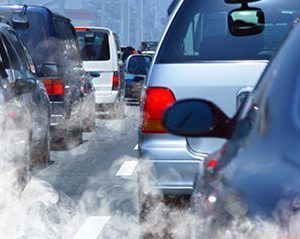- The Best Time of Day to Drink Bone Broth to Maximize Health Benefits
- 8 Ways to Increase Dopamine Naturally
- 7 Best Breads for Maintaining Stable Blood Sugar
- Gelatin vs. Collagen: Which is Best for Skin, Nails, and Joints?
- The Long-Term Effects of Daily Turmeric Supplements on Liver Health
- Could Your Grocery Store Meat Be Causing Recurring UTIs?
- Are You Making This Expensive Thermostat Error This Winter?
- Recognizing the Signs of Hypothyroidism
- 10 Strategies to Overcome Insomnia
- Could Artificial Sweeteners Be Aging the Brain Faster?
California’s Tougher Diesel Emissions Rules Cut Related Deaths in Half: Study

California’s strict limits on diesel air pollution appear to have paid off.
Since the limits were added in 1990, diesel exhaust-related deaths have been halved, with the largest reductions in deaths seen in lower-income communities, a new study finds.
By 2014, California saw a 78% decrease in diesel emissions, while diesel emissions in the United States fell by only 51%.
The number of annual diesel-related cardiopulmonary deaths in California between 1990 and 2014 was half what would have occurred if the state had the same reduction in diesel emissions as the rest of the country, the researchers estimated.
They added that California’s level of reductions in such deaths could be achieved nationwide if the rest of the country adopted similar restrictions.
“Everybody benefits from cleaner air, but we see time and again that it’s predominantly lower-income communities of color that are living and working in close proximity to sources of air pollution, like freight yards, highways and ports. When you target these sources, it’s the highly exposed communities that stand to benefit most,” said study author Dr. Megan Schwarzman, a physician and environmental health scientist at the University of California, Berkeley’s School of Public Health.
“It’s about time, because these communities have suffered a disproportionate burden of harm,” Schwarzman added in a university news release.
Diesel exhaust contributes significantly to a type of air pollution called fine particulate matter (PM2.5), which can affect children’s lung development, trigger airway inflammation and exacerbate asthma and cardiopulmonary diseases.
The researchers also pointed out that exposure to PM2.5 has been linked to poor outcomes from COVID-19, and that nonwhite communities are disproportionately affected by both.
Diesel exhaust has been designated a human carcinogen by California’s Office of Environmental Health Hazard Assessment (OEHHA).
“There are hundreds of studies around the world that link particulate matter exposure and premature death,” said study co-author Álvaro Alvarado, an air pollution specialist at OEHHA. “In cities with higher levels of air pollution, there are also higher hospitalization rates for respiratory and cardiovascular illnesses and more emergency room visits for asthma.”
The findings were published March 25 in the journal Science.
More information
The U.S. National Institute of Environmental Health Sciences has more on air pollution and your health.
SOURCE: University of California, Berkeley, news release, March 25, 2021
Source: HealthDay
Copyright © 2026 HealthDay. All rights reserved.










